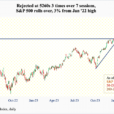The two-day G20 meeting ended Saturday night at a standstill. The Group of 20 economies was unable to agree on a joint push for new stimulus measures and turned their attention instead to upcoming business surveys from China, Japan, Europe the United States.
The G-20 members were in agreement that monetary, fiscal and structural tools were needed in order to boost growth and reiterated past pledges to refrain from competitive devaluations. But there were no coordinated efforts to move things forward.
Investors are concerned that a new global recession is in the offing and are hoping that data over the coming week will show that some momentum remains in the world economy, eight years into its slow recovery from the financial crisis. The week should bring a rate decision in Australia, a GDP data report from Canada and Australia and the full buildup to the US Non-Farm Payrolls.
However, there are still world events that continue to be worrisome. The U.K. is still considering additional spending cuts, Japan is planning a sales tax increase and the U.S. is being thwarted by a lame duck president and Republican-controlled Congress. Analysts are looking to China to introduce fiscal change.
Brexit “Shocking”
One thing most of the finance ministers at the G20 sessions did agree on was that the threat of the UK Brexit would be a “shock” to the global economy. However, here too, there was a difference of opinion with former Chancellor Lord Lawson claiming the G20’s warning was “absurd” because 15 of its members were outside the EU.
Lord Lawson told press reporters, “The British people will not take kindly to being told by the G20 what they should do.”












Leave A Comment